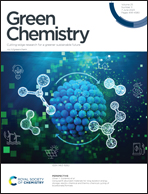Conversion of biomass-derived sugars to 1,1,2-trialkoxyethane via a [2 + 4] retro-aldol reaction over alkaline and alkaline earth metal salts of phosphotungstic acid†
Abstract
1,1,2-Trialkoxyethanes (TriAE) are a class of value-added chemicals that are desirably derived from biomass-derived sugars. However, it has been a big challenge to efficiently and selectively break the C–C bond in hexose to synthesize TriAE. In this study, a series of metal salts of phosphotungstic acid (HPW) were prepared to catalyze several biomass-derived sugars. The effects of the atomic ratio of Cs/H in CsxH3−xPW12O40 (x = 1–3), the reaction temperature, and the reaction time were highlighted. The influences of different biomass-derived sugars (glucose, fructose, mannose, cellulose disaccharide, and cellulose) and different alcohols (methanol, ethanol, 1-propyl alcohol, 2-propyl alcohol, and 1-butanol) were also investigated. It was found that alkali and alkaline earth metal monohydrogen salts of HPW were effective catalysts and the stronger the alkalinity of the metal elements, the higher the catalytic activity. Cs2HPW showed the best activity in catalyzing the conversion of glucose to TriAE via [2 + 4] retro-aldol condensation and as high as 88.44% yield of 1,1,2-trimethoxyethane and 72.56% yield of 1,1,2-triethoxyethane were achieved when reacting in methanol and ethanol, respectively. The catalyst deactivation was due to the coking coverage over the active sites rather than the leaching loss of the active components. This research provides new insights into the selective cleavage of the C2–C4 bonds in hexose and a novel approach to biomass-derived sugar valorization.
![Graphical abstract: Conversion of biomass-derived sugars to 1,1,2-trialkoxyethane via a [2 + 4] retro-aldol reaction over alkaline and alkaline earth metal salts of phosphotungstic acid](/en/Image/Get?imageInfo.ImageType=GA&imageInfo.ImageIdentifier.ManuscriptID=D3GC00587A&imageInfo.ImageIdentifier.Year=2023)


 Please wait while we load your content...
Please wait while we load your content...